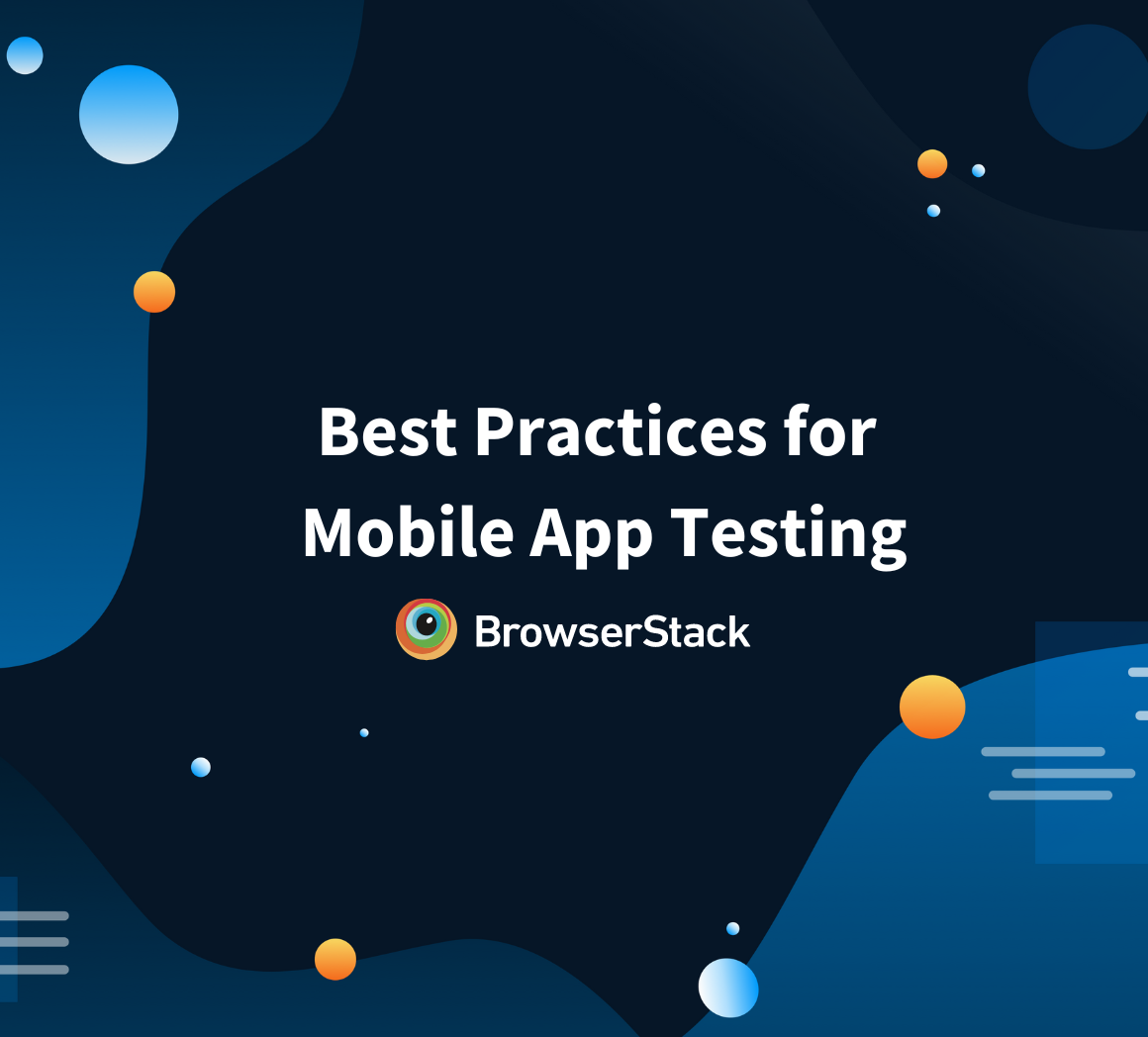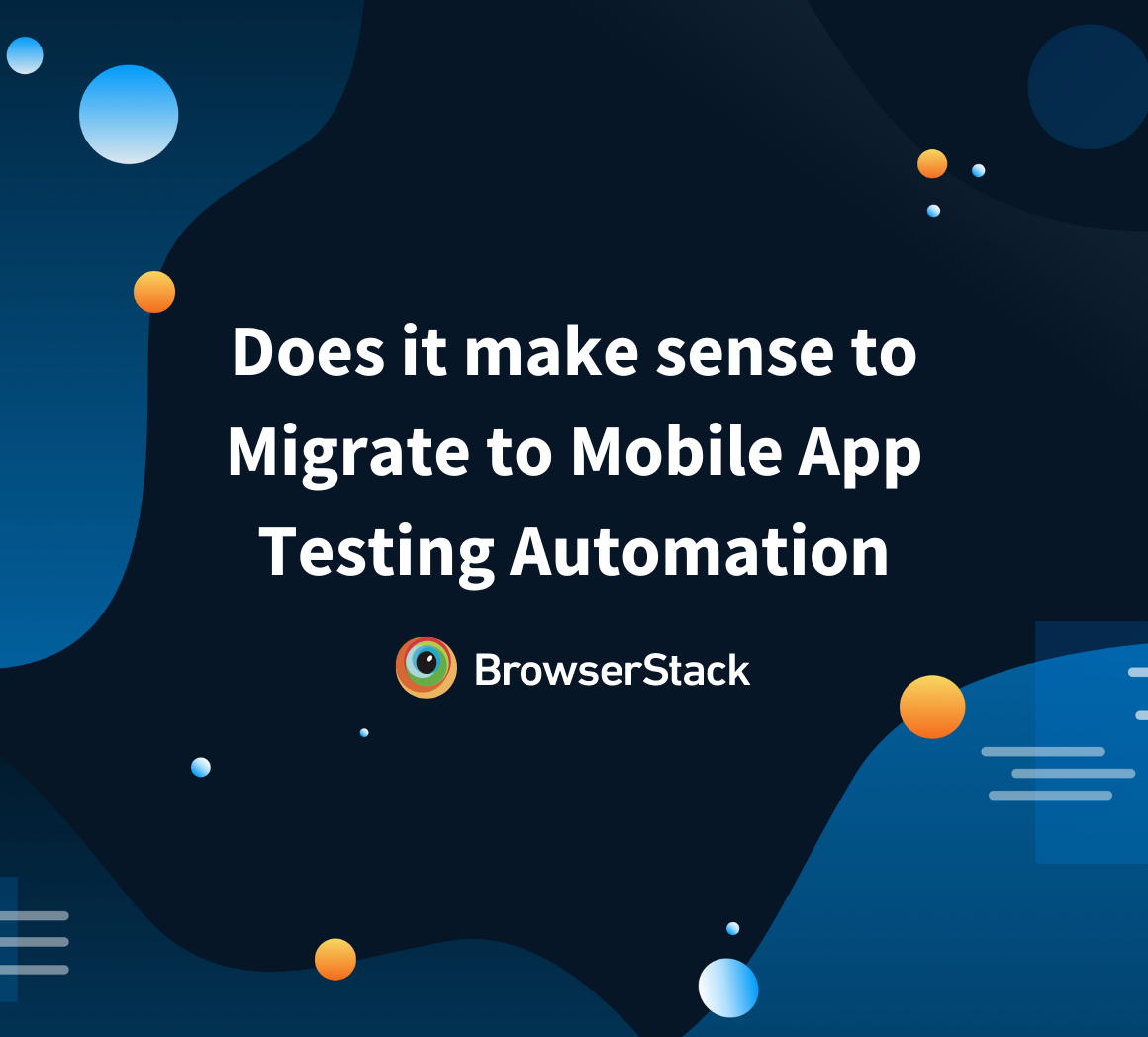How to choose the right Mobile App Testing Services?
By Sakshi Pandey, Community Contributor - December 2, 2022
As of October 2022, over 60% of people are mobile and tablet users. This means that the majority of the population prefers to use mobile phones and tablets over desktop computers. With the rise in the number of mobile users, their demand for mobile applications also increases.
“There’s an app for everything” is a common saying today, but the app market is highly competitive, and most apps are quickly discarded by users as they fail to engage and retain their customers. Mobile App Testing is vital to ensuring that the app design is actually viable. In order to retain user interest, the app shouldn’t be clunky and difficult to use. Hence, it’s important that developers make the app user-friendly and check functionality by running Mobile Usability Tests prior to deployment.
Carrying out mobile app testing can be a difficult task. Rather than having teams waste time learning technologies from scratch and reinventing the wheel, utilizing mobile app testing services is far more efficient.
However, mobile app testing services are diverse and varied. This guide explores what needs to be taken into consideration when choosing a mobile app testing service for an application.
Why do companies use Mobile App Testing Services?
Some of the challenges that lead companies to employ Mobile App Testing Services are:
- Time: Mobile app development is a highly time-intensive process, and a small team of QA would have to struggle and rush to test the mobile application thoroughly. It can be very difficult to learn new technologies on the fly and test all aspects of an application without the aid of a mobile app testing service to keep track of everything and provide tools to ease the testing process.
- Budget: Using paid mobile app testing tools can actually help save money. Individually purchasing certain tools or paying employees to work overtime to reinvent the wheel to test an application can be far more costly than simply subscribing to a mobile app testing service for the duration of the project.
- Experience and Skill: Developers may not have the experience or skill required to test all aspects of an application cleanly, and hence there is a need to build a team of QAs. With the aid of mobile app testing services, you can skip recruiting, building, and managing an in-house QA team.
- OS/Devices: There is no feasible way to test across the multitude of OS and mobile devices available without a Mobile App Testing Service. Few businesses have the resources or budget to purchase real devices and configure them with various functionalities and operating systems. Utilizing testing services to conduct these kinds of tests is more realistic.
- Automation: Many mobile app testing services make automation testing much easier by providing access to better automation testing tools and integration with various CI/CD tools and test automation frameworks, allowing developers to test smoothly and deploy their mobile applications.
Why choosing the right Mobile App Testing Services is important?
Mobile app testing requires sophisticated technologies, which could be highly expensive. Conducting tests across many OS-device combinations, carrying out automation testing, and other specialized tests for individual applications can seem like a constant uphill battle. Thankfully, there are many mobile test service providers on the market that can help.
Unfortunately, the fact that many mobile app testing services are available can also make it difficult for teams to choose the service best suited to their mobile app. In order to choose the right service, it’s critical for the team to draft out a list of criteria that the service provider must cater to. For example: Testing across real devices can be one requirement, and integration with a specific CI/CD platform may be another.
1. Real Device Lab
In the last year, the number of mobile devices was up from 14 billion devices in 2020 to about 15 billion devices in 2021. This year the number of devices is projected to reach 15.96 billion and 18.22 billion by the year 2025. The growing smartphone market makes Mobile Apps even more essential for consumers and businesses alike. However, device fragmentation is a major challenge, which requires Mobile App Developers to ensure that the app works seamlessly and consistently across different devices and platforms.
Upon understanding the severity of Android Fragmentation and iOS Fragmentation, it is necessary to perform cross platform testing. Since the application is developed in a certain device platform might not be consistent in functionality in other device-platform due to the diverse hardware, software, user settings, features, and environments that may exist on the users’ device.
Thus, it is very crucial to know how vast and well-populated a mobile app testing service’s Real Device Lab is. This could be a major deciding factor when choosing a service provider, as it impacts the test coverage.
Having a real device cloud like BrowserStack can be significant as it allows access to real Android and iOS devices from legacy to the latest devices like Google Pixel 7 and iPhone 14 for testing. It also allows QAs to test on different OS versions, including the latest, like iOS 16. BrowserStack is compatible with popular iOS and Android Automation Testing tools, so QAs can easily test and share the comprehensive test reports.
Pro Tip: Ensure that your Mobile App Testing Service Provider uses a Real Device Cloud like BrowserStack for testing to ensure more accurate test results by taking real user conditions and use cases into account while testing.
2. Tech Support
When choosing a mobile app testing service provider, it’s vital to ensure that the service provider is able to provide proactive technical support in case of any issues. Customer support is an important deciding factor, especially if the team runs into a problem and is unable to resolve it; having that specialized support available to them can save a lot of time in troubleshooting.
3. CI/CD Integrations
It would be advisable to find a mobile app testing service that supports major CI/CD platforms being utilized by the application developers. In case you opt for a service provider that supports some other CI/ CD framework than yours, then Migrating the project from one pipeline to another can be cumbersome.
4. Supports Manual or Automation Testing
Ideally, you should seek a mobile app testing services provider which supports both Manual and Automation Testing. However, Depending on the requirements of the application development team, prior to subscribing to a mobile app testing service, it is prudent to check whether it supports manual or automation testing. Services can be very different, and the team should decide beforehand whether they require only automation testing, only manual testing, or a combination of both. This can be an important deciding factor when choosing a testing service.
5. Bug Capture, Analytics Reports, and Debugging
Analytics and Debugging are as crucial as testing itself because the main point of testing an application is to record test failures, provide reports that identify the specific point of failure and then obtain all relevant information required to aid developers in fixing the issues.
Therefore a good mobile app testing service should be capable of providing a report in the event of test failure. This report should detail the precise step at which the test failed as well as detailed information on the environment and test conditions at that moment in time. These reports can come in various forms, including screenshots, text logs, and videos. It’s important to ensure that the reports are in-depth and can be easily deciphered.
 6. Automation Frameworks
6. Automation Frameworks
QA should look for testing service providers that offer integrations with popular automation tools and frameworks. If the team is not well-versed in the automation frameworks, then it affects the testing process. Learning and adapting take time. Hence, it is essential that you ensure that the service provider’s team is skilled in the required test automation frameworks for mobile app testing.
7. Pricing
One of the most crucial considerations when choosing a supplier is the price. Some service providers have exorbitantly high prices. It would be prudent to compare the prices and services offered by different providers before choosing the most appropriate one in accordance with the budget available.
On a closing note,
Many customers delete applications that are slow, occupy too much memory, or are too clunky and difficult to use. This loss of consumer trust and revenue can be easily prevented by carrying out rudimentary mobile application testing. The problem is that companies are often not equipped to deal with the sheer scope and complexity that can come with mobile app testing. The entire ecosystem of mobile platforms, devices, and services can be overwhelming, and It’s nearly impossible to thoroughly test a mobile application independently.
This is why most organizations employ the help of Mobile App Testing Services. While the above list of criteria can help you choose the right service provider, no matter which mobile app services you choose, it is important to use an infrastructure like BrowserStack whether you are opting for Manual or Automated Mobile App Testing for your application.
BrowserStack helps you test advanced features like geolocation testing, qr code testing, barcode testing, biometric authentication on Android and iOS devices, keeping real user conditions into account.


 6. Automation Frameworks
6. Automation Frameworks


